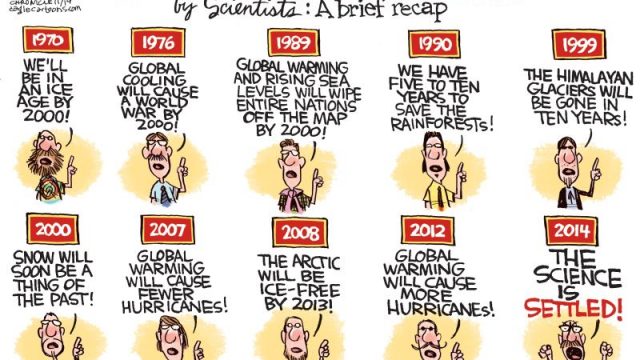John Andrist: The Science Is Settled, Or Maybe Not

Every day there is some kind of report in our news, detailing a new finding, the result of another survey or research study. I generally believe them.
But I’m wondering why.
Many of those studies contradict a previous finding, which no doubt was the result of a similar study.
I read the other day that a scientific study of oil reserves back in 1975 indicated we would run out of oil on this planet by 2015.
Well, 2015 has come and almost gone. We are using much more oil than we did in 1975, and the industry is struggling because we have too much of the stuff.
Likewise, the scientific community told us as recently as 30 years ago that there was irrefutable evidence that our planet was in the grips of global cooling.
It was pretty disconcerting to be forced to think about temperatures going down and oil supplies disappearing at the same time, so we were turning thermostats to 60 degrees to save energy.
Now that scientific community is just as convinced our planet is getting warmer and it portends a different kind of future catastrophe.
Methinks we need to rush to fix the problem before they have another scientific finding that it wasn’t so, or something has changed.
Personally, I think I believe most findings and studies. What I really don’t believe is rushing to begin some man-made solution before we know if it is a solution.
[mks_pullquote align=”right” width=”300″ size=”24″ bg_color=”#ffffff” txt_color=”#000000″]Personally, I think I believe most findings and studies. What I really don’t believe is rushing to begin some man-made solution before we know if it is a solution.[/mks_pullquote]
We now know, I guess, that the polar ice cap is melting in the arctic. We don’t know why the same thing isn’t happening in the antarctic, nor why sea levels haven’t started to rise as they have promised they would.
A generation ago I responded to science by training my taste to enjoy food with less salt. Now doctors are uncertain whether we really do need to do it — based on scientific studies, of course.
Are you one of those Americans who is becoming alarmingly obese, compared to how heavy we were in previous studies. Take heart. There are all kinds of good diets to deal with it — if you know what study to believe.
Much of our research is conducted through our higher education system. It’s done by professors who either aren’t good at teaching or don’t want to teach, so they let teaching “assistants” handle the students, while they conduct research.
That’s how you get to be a university, instead of a college, I guess.
At the public school level we would never turn teaching over to students. Putting teachers in the classroom who are not certified as highly trained, and licensed professionals, would result in all kinds of things, like taking away accreditation and public funding.
There is no doubt in my mind that much of what passes as a scientific study begins as a conclusion. So the study is less than real science and more about trying to validate somebody’s or some group’s belief or bias.
And then there are studies about such things as ants and roaches disappearing from Columbia or bats falling out of the sky and disappearing because of climate change — as if anyone cared.
I’m not opposed to all studies. I am just crying for help to discern which of them are valuable, honest, and useful and which are propaganda, bogus, or work projects of some professor who can’t teach.
After all, 49 percent of those professors also finished in the bottom half of their own class work.
Oh yeah! And it would be nice if they had to include a plan for remediation. You know. Like lighting candles to deal with the problem of darkness.
It doesn’t seem a study has much benefit if it doesn’t incorporate a proposed solultion that is workable.




